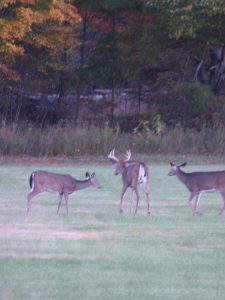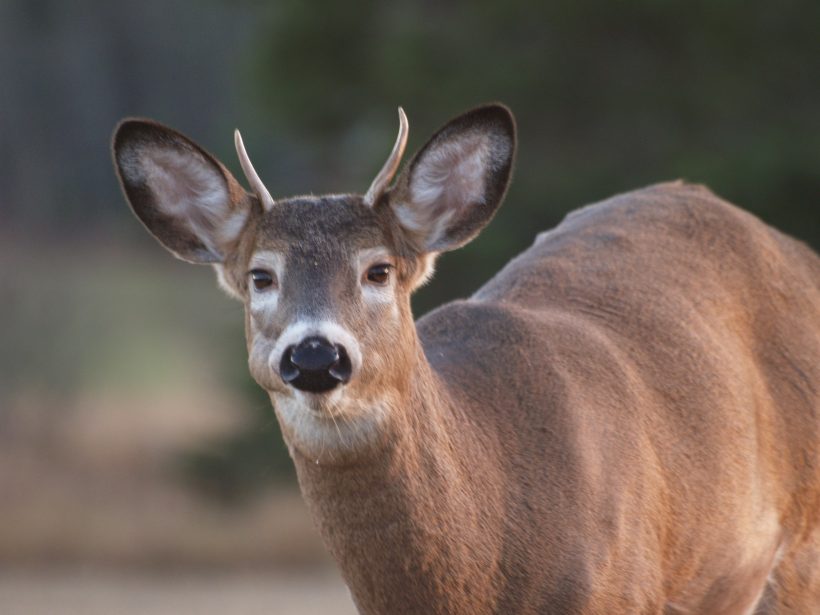WHY NO DEER? September 1975
The argument about deer and wolves has perhaps been the most widely discussed subject. The last few years, since deer appear to be getting less numerous each succeeding year, the arguments are getting to be more frequent.
Deer have been around a long time. When I was quite young men talked about deer hunting, and what it had been like years before. Stories of early days in Haliburton and Muskoka tell us that there were many deer. Early settlers in Parry Sound have told me that when the area was being opened, over a hundred years ago, there were many deer. Then I saw a paragraph from the diary of Champlain when he travelled between what is now Ottawa, and Lake Nipissing. In it he tells about the wonderful stag hunting he had along the way. This sort of refutes the many articles we have seen written by men who claimed to have made a study of deer, wherein the writer tells us that there were no deer before the settlers moved in. Their opinions were only theories, but those early stories prove that there were many deer before the area was settled.

I do have a few records that go a long way back. They show that many years ago, even well before the turn of the 20th century, heavy winters took a heavy toll on the deer, same as they do in this day and age. But the deer did manage to make a comeback.
We had a couple of very severe winters in the early twenties, and many deer perished. Then, when it looked like they were gaining ground, they just seemed to disappear. About the same time deer appeared in the areas where there had been heavy fires a few years previous. There were a few years deer were so scarce that when anyone saw a track by a deer it was unusual. They came back, ten years later, not just a few but groups and we were told the food in the burns had grown out of reach. In a few years we had good hunting, and it held that way, in fact got better each year, until those very bad winters in the late fifties. Many thousand deer died because of the heavy snow and long winter. They did appear to be making some gains about five years later, but then the decline started, and deer are just about as scarce as they were in the late twenties.
Our area is not alone in this respect. I spent three winters north of Sault St. Marie just after the first war, and deer were almost as plentiful as they were then in Algonquin Park. Now the deer are gone from there, as well as along the North Shore, once the best deer producing area in Ontario.
It was not always so. I talked to a number of people who told me their parents could remember when the first deer came to that part of Algoma. It does look like there was a sort of migration of deer to more northern areas, perhaps in the nineties. Too, it is not hard to remember when there were many deer hunters in Timagami. Now one seldom sees a sign of deer.
I remember when on canoe trips in Algonquin Park we saw many deer. If it was river travel, one could expect to see at least forty in a day. I have been in the western side of the park off and on all summer, and we have had canoe trippers, taking quite long trips, and noone has yet reported seeing a deer. The few I have seen have been quite close to town.
What can be done? That question has been asked many times. Everyone in authority seems to think hunting must be curbed, and Muskoka has only three days. Funny, there was no suggestion of lowering the cost of the licence. We have been told that In Parry Sound we can look for just one week in 1976.
Hunters, and I have talked to many, all agree that we must do something, and all are willing to go quite a ways if it will help. But everyone I talked to wondered how the Department could think that a shorter hunting season would save deer, when nothing is being done about wolves, who hunt all year.
Now any old hunter will admit that wolves have been killing deer for many years, and even when we were having good hunting there were many kills. But when a yard has fifty or more deer, and the wolves kill a few, it does not matter. But when they come into a small yard, as has been happening the last few winters, find four or five deer in a small yard, and kill them all, it does matter a lot. But still, the cry is to save the wolves.
Now wolves are not the whole reason. Deer seem to be in a sort of a cycle that is taking them south. A lot of the usual cover for winter shelter is gone. But the woods are full of small growth that should make food.
We are told the range has changed. But when it supported so many deer in 1959, how come it is so poor four or five years later? But the wolf question is one that we might do something about. Even the report published in the local papers mentioned predation as a factor, but offered no solution.
Many blame the hunters, but then why no deer in Algonquin Park? For many falls, previous to 1960, the 90-100 hunters in McCraney Twp. Took 65 to 80 deer, the top being 95 in 1959. The roads meant more hunters, and that thirty square miles with perhaps 150 hunters took three deer in 1974. In 1975 we had a total of six, but there were close to 200 hunters in that quite small hunting area.
I have a clipping, a report from the meetings we used to hold with the standing committee on fish and game, and the Minister told us that they had a program, and give them three years and all would be well. That was in 1967. Only change was to double the cost of the license.
We read every so often about the money that has been spent improving the deer yards. I do not think there has been any of that spent between Highway No. 11 and the park boundary, and there are good sized camps that have not shot a deer for years. Yet many groups still maintain the scarcity of deer is due to hunting. Funny, but in the recent election, when there we so many promises being made, there was not one word about doing anything for the fish and wildlife of the area. So how can we think anyone cares?
Still think if hunters and officials got together for a real hard look at the situation, something still might be done. But it will soon be too late!
